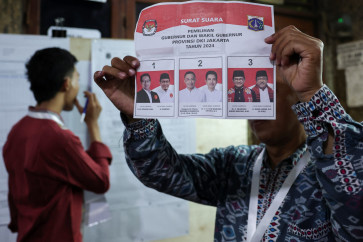Popular Reads
Top Results
Can't find what you're looking for?
View all search resultsPopular Reads
Top Results
Can't find what you're looking for?
View all search resultsRI must polish digital know-how or risk being left behind
I, robot: The humanoid robot Sophia, a creation of Hanson Robotics, speaks during a Telmex Foundation Mexico XXI Century event in Mexico City on Sept
Change text size
Gift Premium Articles
to Anyone
I
, robot: The humanoid robot Sophia, a creation of Hanson Robotics, speaks during a Telmex Foundation Mexico XXI Century event in Mexico City on Sept. 6.(Reuters/Edgard Garrido)
Indonesia must move quickly to formulate a policy that would allow it to tap into the potential of digital technologies like artificial intelligence (AI) and automation, experts say, or else risk falling out of favor with global tech companies as rising wages and more efficient work processes provide fewer incentives to invest in developing countries.
Rapidly growing and disruptive technologies such as AI are expected to have a major impact not only on the economy but also on other aspects of life, from the way we think about social and ethical principles to the formulation of policies, said Yose Rizal Damuri, lead economic researcher for the Jakarta-based Centre for Strategic and International Studies (CSIS).
Yose said the government would need to transform the way taxation and policy-making were handled with regard to the digital economy — and do it fast.
“With automation and increasing wages, there will be less incentive for companies to invest in developing countries. This will certainly determine the position of developing countries in the global production network,” he added.
In order to raise awareness about the issue, CSIS teamed up with the Pacific Economic Cooperation Council (PECC), Prasetya Mulya University and GK Plug and Play Indonesia to host a two-day international conference starting on Monday about harnessing the latest technological advances and their implications for national and global policies.
“With its rapid growth, the digital economy — or intelligent economy — is changing the traditional business model,” Yose told The Jakarta Post on Sunday.
According to the International Federation of Robotics (IFR), the global use of robots in 2020 is estimated to reach 3 million units, tripling the figure of the last decade. The IFR believes this can potentially change the structure of the global value chain and affect international trade flows and investment.
Effects of the rapid pace of change can already be felt in some parts of the world.
One example of this, Yose said, was the 2017 decision of German sportswear giant Adidas to automate its manufacturing of shoes with robots, after more than 20 years of relying on production facilities in Asia.
“They can [now] produce shoes with a quarter of the actual workforce needed [to manufacture them manually]. It is still expensive, but what about in the next five years when the technology continues to develop?” he said. “This will greatly affect developing countries [...] because they can no longer leverage cheap labor as an advantage.”
The CSIS event is expected to be inaugurated by President Joko “Jokowi” Widodo, who is also slated to speak in a segment targeting the youth.
To further drive home its point of the importance of harnessing AI, the event will feature humanoid robot Sophia, who will interact with participants and conference speakers.
President Jokowi pledged last year to prepare five sectors to be developed for the Fourth Industrial Revolution — food and beverages, textiles, the automotive industry, as well as electronics and chemicals — and said they would become the backbone of Indonesia’s own Industry 4.0.
“Development of the five industries is expected to have a great impact on Indonesia’s efforts to improve its competitiveness, and it would contribute to the country’s goal of becoming one of the 10 largest economies in 2030,” the President said at the time.
Jakarta also launched a road map called Making Indonesia 4.0 in April last year and devised an index to measure the productivity and competitiveness of domestic manufacturers.
According to a 2018 study by global consulting firm McKinsey, 78 percent of Indonesian companies are aware of the Industry 4.0 concept. The figure was beaten only by Vietnam at 79 percent, while countries like Thailand, Singapore and Malaysia saw lower awareness rates.
If properly done, Industry 4.0 could add nearly US$121 billion to Indonesia’s gross domestic product (GDP) by 2025, the McKinsey report forecast. From that figure, an Industry 4.0-ready manufacturing sector could provide more than a quarter of the GDP increase at $34 billion, followed by retail at $25 billion, transportation at $16 billion, mining at $15 billion, agriculture at $11 billion, telecommunications at $8 billion, health care at $7 billion, the public sector and utilities at $5 billion and financial services at $2 billion. (tjs)










